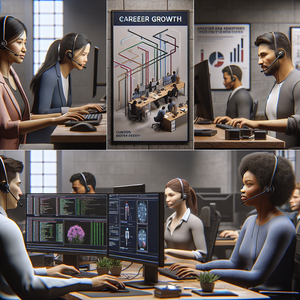
Navigating the World of Entry-Level IT Support Jobs: A Pathway to a Rewarding Career
As our reliance on technology deepens, the need for entry-level IT support professionals is on the rise across the United States. Companies are increasingly leveraging technology to streamline operations, creating numerous opportunities for individuals eager to launch their careers in information technology. This guide aims to illuminate the varied entry-level IT support roles available, the qualifications needed, and potential career trajectories, equipping you with the knowledge to thrive in this dynamic field.
Job Summaries:
IT Support Specialist:
- As an IT Support Specialist, you will be an essential resource for users.
- Addressing hardware and software issues through various channels—phone, email, or in-person.
- Responsibilities will include system installation, configuration, fault diagnosis, and problem resolution.
- A foundational understanding of computer systems and operating systems like Windows and macOS is crucial.
- Strong communication skills are important.
- While a degree may not be mandatory, certifications like CompTIA A+ can significantly bolster your job prospects.
Help Desk Technician:
- Help Desk Technicians serve as the first point of contact for users facing technical challenges.
- They handle incoming requests through calls, emails, and support tickets.
- Providing solutions to issues ranging from password resets to software malfunctions.
- Candidates should possess strong problem-solving skills, patience, and a customer-centric mindset.
- Familiarity with ticketing systems and basic IT knowledge is essential.
- Certifications like CompTIA A+ can further enhance employability.
Technical Support Analyst:
- Technical Support Analysts address more intricate technical challenges.
- Often requiring a deeper understanding of software applications and networking.
- Whether working on-site or remotely, they assist users with advanced issues such as network connectivity and software installations.
- A background in IT or a related field is typically required.
- Proficiency in relevant software is necessary.
- Analytical skills are key to success in this role.
- The ability to communicate technical information effectively is essential.
IT Technician:
- IT Technicians are responsible for the maintenance and repair of computer systems and networks.
- Their duties include routine maintenance, hardware installation, and troubleshooting network issues.
- A strong technical background is preferred, ideally supported by a degree in information technology or a related discipline.
- Certifications such as CompTIA A+ or Network+ are also preferred.
Field Support Technician:
- Field Support Technicians provide on-site technical assistance.
- Traveling to client locations to resolve hardware and software issues.
- This role demands technical expertise coupled with outstanding customer service skills.
- Technicians often interact directly with clients.
- A valid driver's license is vital.
- The ability to work independently is vital.
Desktop Support Technician:
- Desktop Support Technicians assist users with desktop and laptop-related issues, ensuring device efficiency.
- Responsibilities include software installation, update management, and hardware troubleshooting.
- A solid understanding of operating systems and software applications is necessary, along with strong interpersonal skills.
IT Help Desk Analyst:
- IT Help Desk Analysts manage IT-related inquiries through help desk systems.
- Excellent verbal and written communication skills are necessary to assist users effectively.
- Understanding computer systems, software applications, and networking fundamentals is important.
- Strong problem-solving abilities are essential.
Technical Support Representative:
- Technical Support Representatives assist customers by resolving inquiries and technical issues related to products or services.
- They may offer support for a variety of software applications, hardware products, or IT services across different industries.
- Strong communication and customer service skills are critical.
Computer Support Specialist:
- Computer Support Specialists provide technical assistance to individuals and organizations.
- Troubleshooting hardware and software issues.
- Support may be offered in person, over the phone, or via remote tools.
- A background in IT is essential for success in this role.
- Strong problem-solving skills are essential for success in this role.
IT Service Desk Technician:
- IT Service Desk Technicians manage user requests related to IT services.
- Ensuring timely resolutions while maintaining accurate records.
- Strong organizational skills and a customer-focused mindset are essential.
- Proficiency in common software and hardware.
In conclusion, the entry-level IT support landscape presents a wealth of job opportunities tailored to a variety of skills and interests. Whether you are embarking on your career journey or transitioning from another field, these positions lay a strong foundation for growth in the information technology sector. By pursuing relevant certifications, developing technical skills, and refining customer service abilities, you can significantly improve your employability and pave the way for career advancement in IT.
Explore More Jobs
